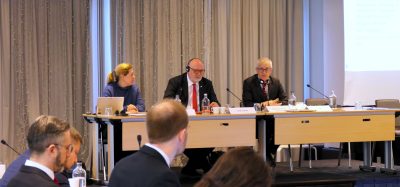COVID-19-related challenges to international railway cooperation: A lawyer’s view
Posted: 7 April 2021 | Platon Guryanov | No comments yet
Platon Guryanov, Head of the International Practice within the Legal Department of Russian Railways (RZD), reflects on the impact of moving to online, distanced working over the past year and deliberates whether this is suited to international railway cooperation going forward.


There was a little anniversary in March 2021: a year ago, my colleagues and I from Russian Railways started distanced work after a COVID-19 lockdown was imposed in Moscow. The initial effect of that situation was perplexity and even frustration, but now, as I type this article sitting at my office desk again, I remember those days as the most challenging and yet prolific in my career.
My team’s main scope of work consists of negotiations within international organisations (governmental and non-governmental), as well as in bilateral format, with colleagues belonging to different states and cultures. Those negotiations normally result in the drafting of legal and contractual rules, according to which the railways function. Such activity has two main aspects: legal and psychological.
Both of these were affected by the shift to the online format. Now, one year on, I suppose that a lawyer’s reflection on the effects brought by the pandemic on international railway business could be useful for those who are involved in cross-border railway transactions.
Winding ways to binding decisions
As the movement of carriages (at least carriages of goods) never ceased, their legal support had to continue too. It was normally provided at bilateral and multilateral international meetings. While the former could easily be switched to online format, things were not that easy with the latter, especially those being held within international organisations.
There are two types of such meetings: of the working bodies (working parties, expert groups, commissions etc.) and of the governing bodies.
The working bodies’ meetings could start taking place once the technical possibilities for that had been provided. As for the governing bodies, their distinctive feature is that they have binding decisions as an outcome. That is why such decisions have to be adopted in strict conformity with the procedure, in order to be properly legitimate.
We had to take those considerations into account when we were preparing to participate in the first online governing bodies meetings of OSJD and CIS Railway Council in 2020. In both organisations, the participants adopt decisions by signing the minutes. Those documents then constitute decisions of international organisations, i.e. a source of international law for the member states.
The rules of procedure of those international organisations also provide for another procedure to adopt the decisions: voting by correspondence (by casting a vote via mail or using the silent procedure).
There was a temptation to mix those two procedures in order to organise online meetings, as they have hallmarks of both: online discussion is reminiscent of the usual offline meeting, but then the secretariat has to send out to the parties the draft minutes, in order to get their approval.
However, from the legal point of view, holding an online session according to the rules for the regular meetings, and then circulating minutes for the approval under the regulations for the mail voting, would mean a breach of both regulations, and would result in a risk of raising an argument of non-legitimacy of the decisions by any interested party.
The situation gets even more complicated when it comes to a mixed meeting, which some participants attend in person, while others connect by means of video conferencing.
It seems to me that those issues could be resolved by amending organisations’ rules of procedure or adopting special rules for online meetings. It also would help to settle such matters as confidentiality and credentials check.
As for the psychological aspect of international negotiations, it consists of several moments.
Psychology matters
International organisations with a large number of members on a trans-Eurasian scale (such as OSJD or ESCAP) are characterised by a wide spread of time zones. An online meeting inevitably leads to inconvenience for some of the participants. On the one hand, you have to reduce the duration of the meeting, but on the other hand, someone is still forced to work at night.
While one has to fight jet lag when coming to a meeting in a different time zone, the timetable of a conference still immerses everyone into the same regime of work and, after a short period of accommodation, the efficiency raises. It feels more stressful when one has to break the usual course of business with early morning or late night online meetings.
Online negotiations also impose restrictions in terms of emotional contact between participants. There is a number of articles in specialised psychology magazines on that topic. Certainly, there is a “chemistry” of the meeting room, which allows participants to “crystalise” compromised solutions. Offline negotiations lack such a chemistry.
The online negotiations miss such important means of reaching amicable and effective solutions, such as coffee breaks and negotiations “on the margins”. Twelve years of experience in the field gives me ground to conclude that such informal contacts often work better than official meetings.
Moreover, they lead to the building of professional relations between railway people of different states. It could be even argued that there is a ‘railway brotherhood’ which allows work to continue effectively even in periods of strict tensions between states.
In the first days of the pandemic, we urgently needed information on how force-majeure mechanisms work in different countries, such as what legal acts on border crossing and railway transport operation have been adopted etc. That would allow us to estimate and prevent legal risks to logistic chains. At that hectic time, prompt obtainment of information became possible via informal communication with lawyers of foreign railways, international organisations and other industries. Such connections would have never existed without previous contacts at international events.
A fine line between online and offline
Online negotiations significantly reduced companies’ expenses. This fact may encourage the railway managers to minimise the number of employees’ business trips even after the reopening of borders. However, there is a need for a balanced approach to such minimisation, in order to not ‘toss the baby out with the bath water’.
Probably most of the working body meetings could be provided in an online format, while the major events such as governing bodies’ sessions should be organised in a regular manner. That would allow the contacts of managers and experts to be sustained, as well as to avoid the issues of the illegitimacy of the meetings’ decisions.
Also, the importance of networking events should not be underestimated. My company has a success story of organising conferences of railway lawyers from different states. Ties with colleagues from abroad, that were then established, keep proving to be a low-cost mechanism for settling legal issues.
Anyway, while we are all waiting for the lift of travel bans, there’s a good chance to remember that, paradoxically, although the world rapidly changes (to what we should constantly adopt ourselves), it nevertheless remains the same place, where relations between people keep their utmost value.


This article reflects a private opinion, not that of the Russian Railways or of Russell Publishing Ltd.






